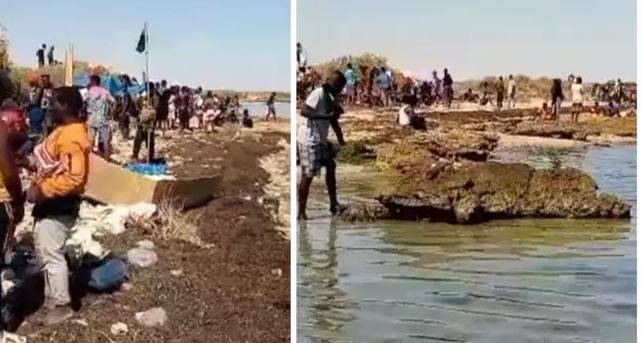Tunisian security forces in Sfax have rounded up hundreds of people from sub-Saharan Africa, including children, and dropped them in a no-man’s land between the Tunisian and Libyan borders, where they remain trapped with neither food nor water.
These forced deportations carried out by the security services come against a backdrop of heightened anti-migrant rhetoric and violence that broke out in Sfax on the night of July 3. Our team spoke to a man from the Ivory Coast who said that some people had died and that more than 300 people were trapped at the border in terrible conditions.
Our team spoke to a man from Ivory Coast, whom we called Adama. He told us that Tunisian security forces forcibly deported him, along with about 20 other migrants, dropping them off at the border on July 2. This was a day before clashes broke out in Sfax. The ongoing violence has been accompanied by a wave of migrant arrests.
In the days since, Tunisian security forces have forcibly deported several other groups of migrants to the same no-man’s land between Tunisia and Libya. Adama sent his location to our team on July 6; he’s in an area next to the coast, not far from the border post in Ras Jdir.
'I told UN agencies, but the Tunisian authorities haven’t yet allowed them to meet with the group of people stranded. Lauren Seibert, a researcher with Human Rights Watch, found out about the vulnerable people dropped in the desert when she found a tweet on July 3.
I talked to some of them, and they told me that the security forces had beaten them and broken their phones. The group included pregnant women and children. I discovered that at least two of the people were registered as asylum seekers with the UN High Commissioner for Refugees. I told UN agencies, but the Tunisian authorities haven’t yet allowed them to meet with the stranded group.
Migrants at the Libyan coast
Some are drinking sea water'
Adama lives in Tunis but traveled through Sfax when he was arrested on July 2. He told us that conditions were worsening for people stranded there. Neither the Tunisian nor Libyan border guards will let people pass. There are at least 300 of us near the border. The National Guard arrested us in different locations—in Sfax but also in small villages near Tunis.
They didn’t explain anything; they just left us here, next to the sea. Without food or water. Some people drink seawater.
I am from Ivory Coast, but there are many other nationalities: Cameroon, Senegal, Chad, Togo, Benin, Guinea, and Mali. The children have started getting sick from dehydration. We don’t have medicine and a lot of people have injuries from when the National Guard beat us with batons [Editor’s note: Adama sent our team images of people with head injuries as well as injuries to their arms, legs, and feet].
We tried several times to return to Tunisia, even just to buy food, but the soldiers prevented us. They even threw stones at us. And, once, a man in civilian attire chased us with a baton.
We tried to get to the Libyan side as well, but the guards told us to back off. And later, they burned down one of our tents [Editor’s note: a makeshift shelter built with sheets]. It is becoming more and more tense. We asked Libya for water, but in vain.
On Wednesday afternoon, an NGO tried to reach us, but Tunisian soldiers refused access. A Spanish journalist also tried to see us, but they wouldn’t let him through either. They threw us into this place, so we couldn't leave. Help us, please!
Adama said that at least three people died from injuries. We could not confirm this. Tunisia's migration situation has deteriorated dramatically in the past few months. Anti-migrant rhetoric has increased, including by the president himself.
The latest wave of violence was sparked by a Tunisian's death, blamed on three sub-Saharan Africans.
Tunisian politician Moez Barkallah told the news agency Tunis Afrique Presse (TAP) that, since June 28, 1,200 people from sub-Saharan Africa have been deported via Sfax to the borders with Libya and Algeria.
Summer has meant more migrants travel to Sfax, where they wait to board boats headed for Europe. This is especially true of the nearby Italian island of Lampedusa.
Source: france24




No comments yet
Be the first to share your thoughts!